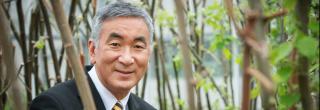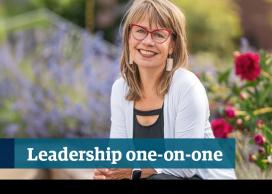Dr. Rickey Yada is Professor and Dean of the Faculty of Land and Food Systems. A Vancouver native, Rickey earned his BSc (Agriculture), MSc and PhD from UBC, before heading to the University of Guelph, where he spent the last 30 years.
In October 2014, Rickey returned to UBC to commence his five-year Deanship, bringing to the role a strong commitment to research, teaching and learning.
Q1. After 30 years at the University of Guelph, what made you decide to return to UBC?
RY: I was really excited by the opportunity to return to Vancouver and work at one of the premier universities in Canada and the world. After 30 great years at Guelph, coming back to UBC also meant that I could bring the knowledge and partnerships I developed there to the west coast. It feels good to be back.
Vancouver’s moderate temperatures are also much more amenable to my dress attire (as I like to wear shorts). In Guelph, I’d wear shorts when there was still snow on the ground. In Vancouver, I can wear shorts year round!
Q2. What quality do you most admire in a leader?
RY: I admire the ability to lead by example. I tried to do this when I was department chair at Guelph, by modeling the expectations of faculty around teaching, research and service. I will continue to do the same as a Dean at UBC.
I also admire the ability to be consultative and a good listener, and to be able to make thoughtful decisions.
Q3. What makes you laugh?
RY: I like comedians because they take every day occurrences and make them funny. Much like scientists, who make observations that most people wouldn’t notice, and see something special about them… Both comedians and scientists make me more attentive to my surroundings and notice things I wouldn’t otherwise pay attention to.
I recently watched The Big Lebowski and John Goodman cracks me up in that movie because he’s not afraid to say the things that most of us would probably keep inside!
Q4. Who inspires you, and why?
RY: I’ve been lucky to have some very good mentors in my life. As an undergraduate, I had a very inspiring microbiology professor. Prior to the days of PowerPoint, he would lecture with no notes or prompts, and from him I learned the art of lecturing.
I was very fortunate to have an excellent master’s advisor – Brent Skura. He inspired me because he wasn’t much older than myself at the time, and we would sit down often and learn together. So the whole notion of being a life-long learner was reinforced by my experience with Brent.
For my PhD Dr. Shuryo Nakai was my mentor. At the time, he was the premier food protein chemist in the world. From him I learnt the ability to problem solve. When I couldn’t resolve an issue, he taught me to do error analysis before asking for help.
Q5. What’s been your biggest accomplishment so far at UBC?
RY: It’s still early days, but so far I’ve spent a great deal of time meeting with my constituents – including students, academic partners and industry partners – to help me get a lay of the land and identify opportunities for collaboration and growth.
Right now we’re in the middle of a strategic planning process. We’re figuring out what we can do over the next five years and how we intend to measure our success, and I’m trying to do that in as a transparent, open and honest way as possible.
Q6. What’s the most important lesson you’ve learned?
RY: To not only hear people, but to listen to them. I strive to be a good listener, and to take in information that people tell me and really process it, and then use what I’ve listened to, to decide on the next action.
Q7. What is your favourite song?
RY: I don’t have a specific favourite, but I love musicals. I grew up listening to musical soundtracks on my siblings’ LPs. Some of my favourites are The King and I, Camelot and Carousel. Living in Guelph afforded me the chance to go to Stratford often, where I would often watch musicals. Part of me would love to be a thespian!
Q8. How do you like to recharge?
RY: About eight years ago, I underwent bypass surgery, and the doctor recommended that I take up walking – about an hour a day. The thing I appreciate about walking is that it gives me the ability to decompress. I like being located on the south end of campus in the H.R. Macmillan building, because most of my meetings are on the other end of campus, meaning I have lots of opportunities to walk, and at the same time take some quiet reflection time.
Q9. For you, what makes UBC different?
RY: I’m very proud to be a graduate of UBC because it’s a university that’s recognized globally for its excellence and quality. One of the attractive things about coming back here was to come back to such a top global university with access to world-renowned researchers. We’re a small Faculty, but we have the ability to grow and in creative and innovative ways.
Q10. What makes the Faculty of Land and Food Systems unique?
RY: In the Faculty of Land and Food Systems we don’t have departments but various areas of expertise. As part of our strategic planning process, we’re talking about how to bring these various disciplines together and work together in a synergistic manner. It’s an exciting process.
Our Faculty is also unique because we have a living lab on our doorstep. The UBC Farm gives our students the chance to practice the lessons we teach in the classroom, right here on campus. How cool is that?
The size of our Faculty also affords us the chance to personalize the educational experience. Our students get to know us as people, and I have the luxury of getting to know each individual faculty and staff member on a first-name basis.
Q11. What do you value in your colleagues?
RY: Openness, transparency and honesty. I hope that my colleagues feel they can be honest with me. There’s no way I can make course corrections if I don’t hear their honest, open opinions.
Q12. Who are your favourite writers?
RY: One of my favourite authors is Rohinton Mistry, who writes about the period when India gained independence. Like comedians and scientists, he makes everyday occurrences special. In his novels, he describes a train platform, and you can feel the heat, you can feel the humidity, you can feel the over-crowded train. His ability to transport the reader to a scene is an incredible talent.
Q13. If you could have a super power, what would it be?
RY: Given the number of activities I like to be involved in, being omnipresent would be pretty cool! It would be great to be able to process everything simultaneously and be able to make rational decisions at the same time as well.
Q13. What would you like to be remembered for?
RY: This was the last question asked of me during the interview process for this job. I said, I’d like to be remembered as a person who accomplished what they set out to do. Now I’d add that I’d like to be remembered for being a good listener, open and transparent as well. That’s what I truly aspire to be.
Published: June 1, 2015
Interviewed by: Megan Czerpak, UBC Internal Communications



